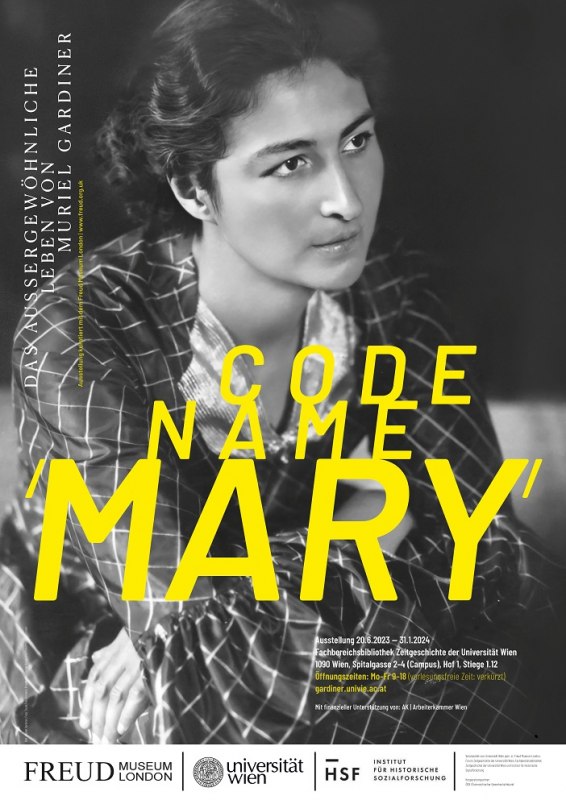Muriel Gardiner Buttinger, Dr. med.
Muriel GARDINER (née MORRIS, remarried name BUTTINGER), born in America, came to Vienna in 1926 to study psychoanalysis and medicine and to support "Red Vienna". She fought for democracy and freedom in the resistance against Austrofascism and National Socialism.
- Medicine
- Psychoanalysis
Muriel Morris was born in Chicago/USA in 1901, the daughter of a wealthy meatpacking magnate. She studied at Wellesley College in Massachusetts until 1922 and then went to Rome for a year abroad. She later studied literature at Oxford and, after a brief marriage, came to Vienna in 1926 to be analyzed by Sigmund Freud. He passed her on to his student, the American Ruth Mack Brunswick. After her psychoanalysis, another brief marriage to the Englishman Julian Gardiner, who studied music in Vienna, and the birth of her daughter, she remained in Vienna as a single mother and took up training analysis in order to become a psychoanalyst herself. She therefore began studying medicine at the University of Vienna in 1932 so that she could later work as a psychoanalyst in the USA.
Although she came from a wealthy family, she was a convinced socialist and, fascinated by the social achievements of „Red Vienna“, joined the socialist underground movement in Vienna in 1934 after the elimination of democracy by Austrofascism. There she met her future husband, the leader of the Revolutionary Socialists, Joseph Buttinger. Muriel Gardiner worked under the code name „Mary“ in the anti-fascist resistance, made her two apartments (especially the one in Lammgasse 8) and her remote vacation home in Sulz in the Vienna Woods available for conspiratorial meetings and, before and after the „Anschluss“, risked her life to help numerous politically and/or „racially“ persecuted people to escape with money, guarantees and false passports.
Muriel Gardiner had completed her psychoanalytic training analysis in Vienna in 1937 and pursued her medical studies. She remained in Vienna after the „Anschluss“ despite increasing danger and completed her studies in June 1938 with a doctorate in medicine despite numerous harassments. She was herself at risk due to her long period of resistance and, although she was an American of non-denominational background, was considered a „Jewish half-breed“ by the Nazi state.
„Prudence, as well as the protection of her young daughter, would have advised that she follow the example of the many other Americans who did not hesitate to return to their native country, in her case to the safe, comfortable, and luxurious background which the book describes so well. (...). Nevertheless, and in the face of all reason, she remained, apparently with the aim of finishing her medical studies, but even more to help her friend's political collaborators. And from these, her helpfulness and compassion began to
spread: to their friends; to the friends of friends; to anybody in trouble, however remote and unfamiliar; until she was surrounded by a whole crowd of potential victims who looked to her as possibly their only hope of salvation.“ (Anna Freud, Introduction to Gardiners autobiography).
Soon after completing her doctorate, she left Austria and went to Paris, where she married Joseph Buttinger, who had already fled there. Together they emigrated to the USA after the outbreak of war in 1939 and were both active in refugee aid for many years. Her husband worked mainly for Vietnam refugees in the 1950s and, although he had no university education, was regarded as one of the best historians of the Vietnam War. Muriel Gardiner worked as a doctor, author and psychoanalyst in the USA and became known for her work on Sigmund Freud's famous case of the „Wolf Man“ about infantile neuroses. As early as 1978, she published her first political autobiography together with Joseph Buttinger: „Lest We Forget – Our Years 1934 to 1947 in Vienna, Paris and New York“, but it was not until 1983 that she published her personal memoirs under the title „Code Name 'Mary'. Memoirs of an American Woman in the Austrian Underground.“ Her biography is also linked to that of the American writer Lillian Hellman. In 1973, Hellman published the memoir „Pentimento“, the most famous chapter of which, „Julia“, was successfully filmed with Jane Fonda and Vanessa Redgrave. The story is based, without declaring it, on parts of Muriel Gardiner's biography, which Hellman combined with freely invented statements about her own life.
This unusual case of „appropriation of biography“ was later the subject of a sensational lawsuit for damages in America, in which Muriel Gardiner did not take part.
In 1971, Joseph Buttinger donated his private socio-political library of around 50,000 volumes to the University of Klagenfurt, which was still in the planning stage at the time, as the basis for the university library. He was later made the first honorary doctor of the new university and had already been awarded the Grand Decoration of Honor in Gold for services to the Republic of Austria. In 1980, Muriel Gardiner was awarded the Cross of Honor for Science and Research I. In 1989, the Muriel-Gardiner-Buttinger-Platz in Vienna-Favoriten was named after her.
She died in 1985 in Pennington, New Jersey/USA.
In 2023/24, the University of Vienna, together with the Freud Museum London, curated the exhibition „Code Name 'Mary': The Unusual Life of Muriel Gardiner“, which commemorated her and her achievements.
Zuletzt aktualisiert am 04/17/24

